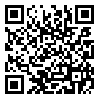Volume 1, Issue 1 (2013)
CLRJ 2013, 1(1): 3-46 |
Back to browse issues page
Download citation:
BibTeX | RIS | EndNote | Medlars | ProCite | Reference Manager | RefWorks
Send citation to:



BibTeX | RIS | EndNote | Medlars | ProCite | Reference Manager | RefWorks
Send citation to:
Ja'afarpoor M, Shojaee A, Alavimoghaddam M, Mohammadian A, Estaji E. Iran’s Myth in Hossein Mojib Al-Mesri’s Comprehension and Interpretation Mirror. CLRJ 2013; 1 (1) :3-46
URL: http://clrj.modares.ac.ir/article-12-7082-en.html
URL: http://clrj.modares.ac.ir/article-12-7082-en.html
Milad Ja'afarpoor  1, Abdolkarime Shojaee2
1, Abdolkarime Shojaee2  , Mehyare Alavimoghaddam3
, Mehyare Alavimoghaddam3  , Abbas Mohammadian4
, Abbas Mohammadian4  , Ebrahim Estaji4
, Ebrahim Estaji4 
 1, Abdolkarime Shojaee2
1, Abdolkarime Shojaee2  , Mehyare Alavimoghaddam3
, Mehyare Alavimoghaddam3  , Abbas Mohammadian4
, Abbas Mohammadian4  , Ebrahim Estaji4
, Ebrahim Estaji4 
1- Ph.D. Student, Department of Persian Language and Literature, Yazd University, Yazd, Iran
2- M.A. in Arabic Language Translation, Sabzvari Hakim University, Khorasan Razavi, Iran
3- Associate Professor, Department of Persian Language and Literature, Sabzvari Hakim University, Khorasan Razavi, Iran
4- Assistant Professor, Department of Persian Language and Literature, Sabzvari Hakim University, Khorasan Razavi, Iran
2- M.A. in Arabic Language Translation, Sabzvari Hakim University, Khorasan Razavi, Iran
3- Associate Professor, Department of Persian Language and Literature, Sabzvari Hakim University, Khorasan Razavi, Iran
4- Assistant Professor, Department of Persian Language and Literature, Sabzvari Hakim University, Khorasan Razavi, Iran
Abstract: (10726 Views)
Comparative mythology partly is a one of the modern courses, which have been used broadly from the second mid-nineteenth century. On the one hand, the relation of this approach has become firm in the comparative literature, and fixed in the mythical critic, on the other. Though at first, the necessity recognition of world's nations myths was introduced widely and comparatively by the European’s and broad researches were done by them, especially in the field of European nations (Rome and Greek's) myths, but the extent of this approach in the Islamic nation's myths did not progress, except of some small and separated surveys on myth motives. In 2000 AD, Hossein Mojib Al-Mesri, by understanding this poverty research, in “Comparative research in Arab, Iran and Turk's myths”, took the first step in comparison of Iranian, Arabic and Turkish's myths. It is wonderful that, even after a decade, researches did not refer to this. Mojib Al-Mesri, in this comparative research, has studied every Iranian, Arabic and Turkish's myths in three separate parts. However, this book does not operate according to the twentieth century mythical critic approach, but in Iran's myths study, it exhibits modern conclusions and achievements in comparative mythology and in this way, compares unfamiliar Arabic and Turkish's myths with similar Iranian samples that have not been studied in any research so far. This paper has tried firstly to clarify the myth relation and functioning of mythology in comparative literature and then introduce Hossein Mojib Al-Mesri's achievements. Then in a more limited scope, it reviews his theories that he received from Iran's myths. In the end, it shows the existing common points between Persian myths with Arabic and Turkish samples in two sections of religious and historical myths. The purpose of this essay is revealing the potential capabilities of Islamic nations' myths. It also recommend the necessary changes, which must occur in one-sided and unilateral views of Iranian or Non Iranian mythologists.
Received: 2012/02/20 | Accepted: 2012/05/9 | Published: 2013/03/21
| Rights and permissions | |
 |
This work is licensed under a Creative Commons Attribution-NonCommercial 4.0 International License. |







